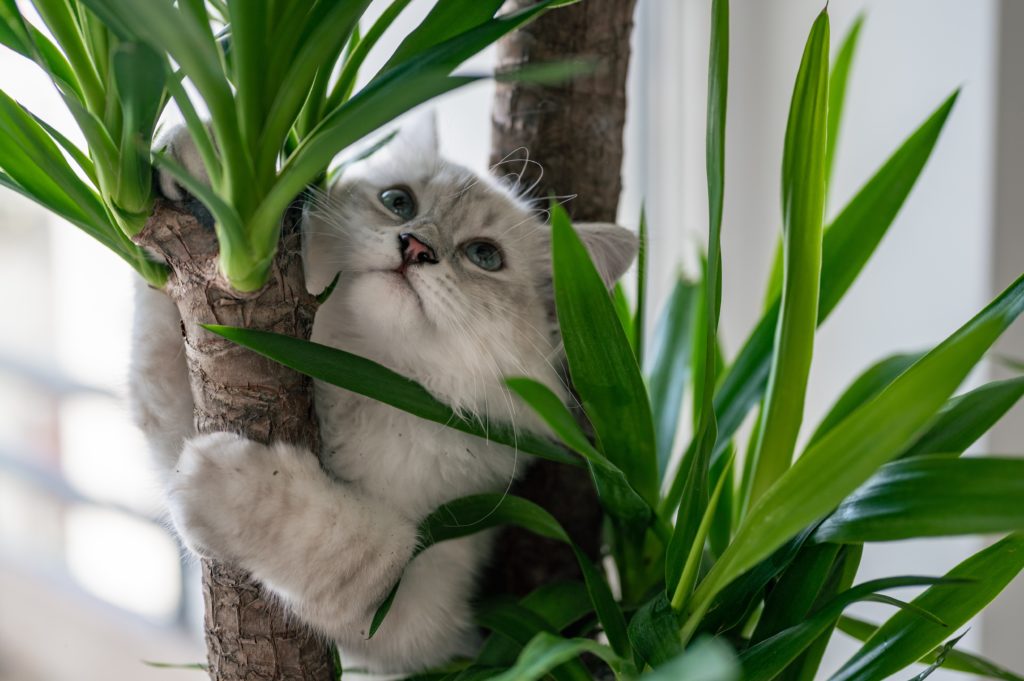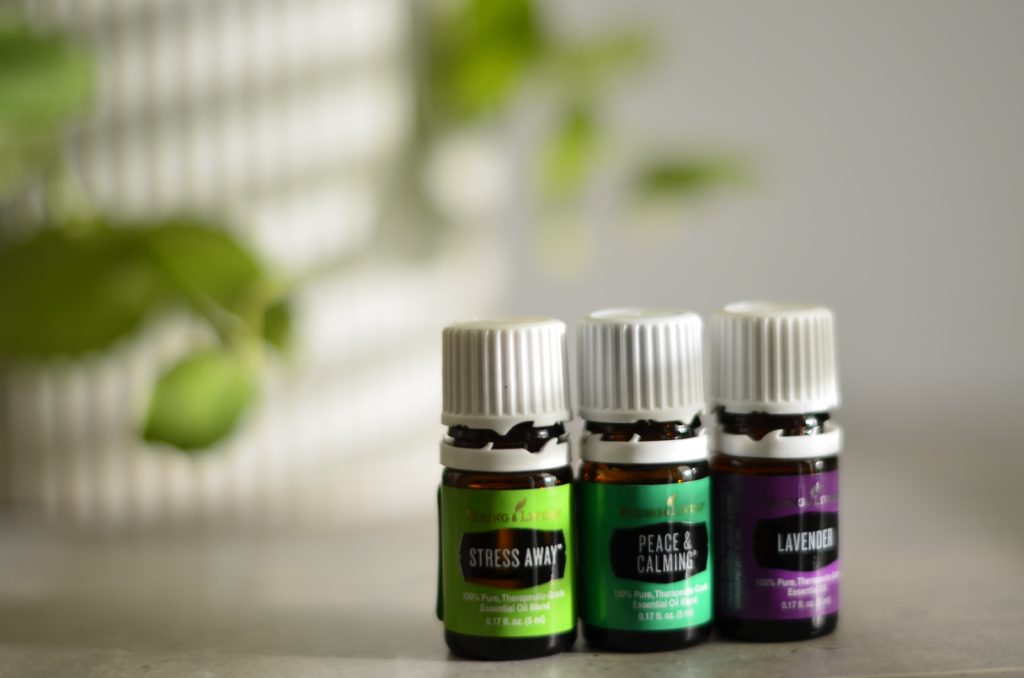The Truth About Essential Oils And Cats

Several years ago I went to a workshop to learn about essential oils and first aid for people and pets. In fact, one of the teachers was a holistic veterinarian. It was the first time I got the nitty gritty on what essential oils were, how they’re made, how to determine quality, and most importantly, how to use them. Obviously, it was fascinating and opened up a whole new world for me in terms of my holistic toolbox.
Growing in popularity, essential oils have become the new buzz word when it comes to aromatherapy, body care products, pet grooming products, and even supplements. Being a cat owner I was curious to learn how I could safely use them with my cats. There’s a lot of fear and misinformation floating around the internet and Facebook. So how do you decipher what is true and what is not? When it came finding answers about essential oils and cats I sought out an expert: Dr. Melissa Shelton, DVM.
Essential oils and cats– setting the record straight
Dr. Shelton recently sent out a very long and detailed discourse on the scientific evidence surrounding essential oils and cats. Obviously, she was tired of hearing and reading about false information and blame for cats dying from essential oil use that she wanted to set the record straight. She began the medical use of essential oils in her practice in 2008, and in 2014 she introduced her own line of veterinary essential oils. Without a doubt she has had lots of experience over the years and even uses them on her own cats.
Her newest book, The Animal Desk Reference: Essential Oils for Animals, 2nd edition, just came out, and I was so excited when my copy arrived! The information in this article gives a few glimpses into the great information she shares.
Unfortunately there’s a lot of confusion regarding the metabolism of essential oils and cats. Common allegations include:
- Cats are deficient in their liver enzymes
- They cannot metabolize essential oils
- The oils will build up over time, creating horrible side effects and potential death
Her premise is this: cats are cats–not dogs–and how they metabolize oils is different. They’re not deficient, they’re just a different species with a different set of biological traits.
Where did the misconception about essential oils and cats come from?
In Dr. Shelton’s own words she explains:
“One main research article that is used to support that phenols are toxic to cats is from 1972. This is very, very old in the medical field. And if one reads further into the research, it has nothing to do with natural essential oils, and everything to do with benzyl alcohol being injected, added to meat products as a preservative, or used as a bacteriostatic in drug or biological products. Sure, if you only read the headline of “Toxicosis in cats from the use of benzyl alcohol in lactated Ringer’s solution” in the Journal of American Veterinary Medical Association in 1983, you may worry also about the use of any phenol. However, we really need to evaluate apples to apples. If you knew nothing of veterinary medicine, feline physiology, or the vast difference between a chemical benzene ring and a natural substance containing a benzene ring, you would err on the side of caution. Which seems to be the case for most of the aromatherapy world at this time.
And sadly, more current information is out there. Even in the November 1984 edition of Veterinary Clinics of North America: Small Animal Practice – Vol. 14, No. 6; titled Symposium on Advances in Feline Medicine II, there is an incredibly profound statement by Jeff R. Wilcke DVM, MS. “Even drugs known for toxicity in cats can be used safely if we are aware of and compensate for certain peculiarities.” That basically says it all. And that is 1984! Here we are – some 33 years later, still questioning if essential oils are killing cats, and reporting all over the place that it is a huge area of concern.”
The reality is, cats would be dying in huge numbers if diffusing oils in our homes was that dangerous. Does quality matter? Absolutely! Synthetics, altered or any oil that isn’t therapeutic grade, 100% pure shouldn’t be used with pets. She continues to say:
“Any essential oil that would be more towards a “fragrance-grade” oil will have the potential to cause long term problems. Just as we documented cases of liver value elevation in homes with a lot of air freshener and artificial fragrance use, these lesser essential oils are akin to spraying perfume on your cat and wondering why that didn’t bode well. And it is just unfortunate in the current market of essential oils that there are so many poor grade essential oils being sold as high quality. If you are purchasing an essential oil based on cost, or because it is easily available at the health food or grocery store – you have likely already selected some of the poorer grade oils on the market.”
Can cats metabolize essential oils?
Indeed we have to ask: are cats able to metabolize essential oils? Yes they can! Their metabolism is just different. Dr. Shelton gives a great explanation:
“[Oils] will not build up over time, although cats can have what we refer to as a different half-life for a chemical, or elimination time. In a study of plasma half-lives for sodium salicylate it was discovered that ponies, swine, goats, dogs, and cats had drastically different elimination times. Ponies had a 1.0 hour half-life, while the others displayed 5.9, 0.78, 8.6, and 37.6 hours respectively. A cat actually took almost 38 hours to eliminate the drug, while a dog took just under 9. Does this mean the cat is deficient? No, it means the cat is not a dog, and the cat is not a goat, and the cat is not a pony! And look at how fast a goat eliminated the drug – we do not call the other species deficient in the goats shadow – we just accept that there are species differences. And that my friend, is how drug doses are created.”
Consequently, essential oils need to be regarded similarly to how we use drugs. There are species considerations, dosing considerations, and interval considerations. This is normal.
As long as oils aren’t grossly mis-used or overdosed they are quite safe to use with cats. Scientific data shows that cats do have lesser amounts of the enzymes required for metabolism of some oils. Because of this they require a more cautionary approach.

Specific oils and concerns
- Citrus Oils- these oils are highly effective in deterring and killing fleas. In addition, they are safe for the cat as long as the spray or dip isn’t used in high concentrations. Examples of citrus oils include lemon, lime, orange, grapefruit, bergamot, mandarin, tangerine, petitgrain, and neroli.
- Linalool- this is a terpene that is shown to be very effective against fleas and safe to use with cats as long as it’s not used in high concentrations.
- Eucalyptus- as long as there isn’t gross and toxic misuse of the oil, it does not appear to have extreme toxicity concerns. Research supports that while topical and oral administrations of this oil should be done with care, diffusion is likely harmless.
- Phenols- research shows that cats have a decreased ability to metabolize phenols, but this does not mean that they are completely unable to do so. Carefully consider the dose and frequency when administering them. Examples of oils with higher amounts of phenols include cinnamon, clove, thyme, oregano, savory, and cassia.
- Benzene Rings, Benzyl Alcohol- Benzyl alcohol is mainly found in “essential oils” that are not recommended for use with animals. These include Benzoin and other absolutes such as hyacinth, narcissus, violet leaf, champaca, bakul, and jasmine.
- Pinene and Terpineol- these can be used safely with proper dilutions and protocols
Ways to safely use essential oils with cats
Make sure you use therapeutic grade oils! Yes, they are more expensive. However, they are not diluted with other chemicals or additives and they are produced under strict quality controls. Therefore, therapeutic oils are pure oils and can safely be used aromatically, topically and internally.
Litter box recipes–take 1-3 drops of the chosen essential oil essential oil blend and add to 1 cup of baking soda. Store this mixture in a glass jar and allow it to “marinade” over night; shake it well several times. This mixture can be added to unscented litter. In addition, t’s also a good idea to have a second box without the essential oil mixture in case your cat doesn’t like the smell. You don’t want to create litter box avoidance! Here are some blends to consider:
- For Gastrointestinal Support: Copaiba, Ginger, Peppermint (often smaller amounts)
- For Thyroid Support: Copaiba, Myrrh, Ledum
- For Cardiac Support: May Chang, Copaiba, Helichrysum
- For Sugar Handling Support: Black Cumin Oil, Myrtle, Anise
- For Liver Support: Ledum, Copaiba, Helichrysum
- For Virus Support: Melissa (often smaller amounts needed), Copaiba, Geranium
- For Renal/Kidney/Urologic Support: Juniper, Copaiba, German Chamomile
Three ways to administer oils
Water-Based Diffusion–using an ultrasonic diffuser you can add oils to water and diffuse them aromatically. Some cats leave the room if they don’t like the smell, and others may not mind it at all.
Petting the cat–place a drop of the oil in your hands and rub them together. Simply by petting your cat the oil absorbs into the cat’s fur. As a result, the oil is likely to be ingested orally during grooming.
Oral administration–although it’s not common, oils can be given directly in the mouth or by capsule. However, the most desired way is for the cat to ingest it by licking and grooming, and this is “adequate to create a therapeutic response.”
Essential oils are powerful, living substances and must be used with respect and care. Muscle testing is the very best way to determine if your cat would benefit from the use of essential oils. It can also determine which method of application is best. In an interview with Ty Bollinger in The Truth About Pet Cancer documentary Dr. Shelton stated that essential oils are a wonderful complement to conventional veterinary care. When used together these techniques can produce excellent benefits.
Listen to holistic veterinarian Dr. Karen Becker’s interview with Dr. Melissa Shelton below!
Want to learn more about how muscle testing works? Check out this page.

